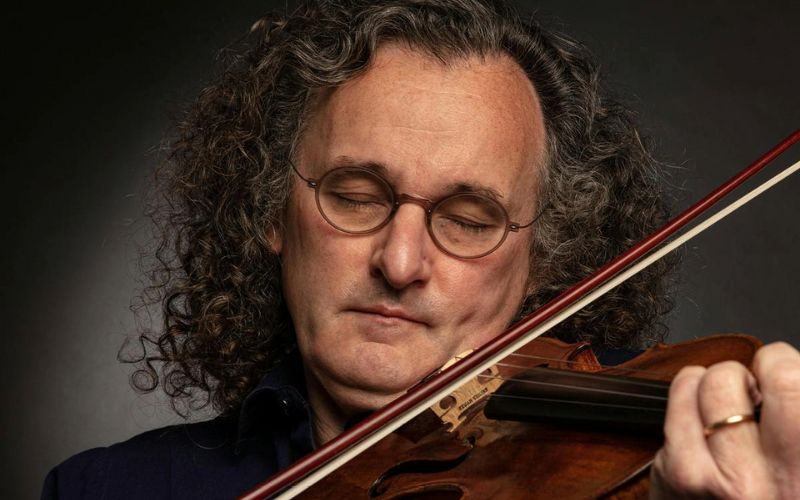Kneecap, a trio from Belfast who raps almost exclusively in Irish, is reinventing Irish rebel music.
“I never thought I’d get to New York rapping in Irish.”
So announced Mo Chara, one-third of West Belfast’s hip hop group Kneecap, which brought down the house at the Lower East Side’s Mercury Lounge on Saturday, March 7 as part of the annual Craic Fest. But you wouldn’t catch a hint of such doubt in observing the young crowd, drinks in hand, dancing and singing along as gaeilge throughout the 45-minute set.
Read More: Celebrating Gaelic gangster rap in Ireland this Seachtain na Gaeilge
For a language spoken daily by less than 80,000 people, a scan of the crowd showed a familiarity with the fast, rolling lyrics about rebellious hijinks: partying in the streets of Belfast, running from the police and getting thrown out of the bar by bouncers. In the packed bar, you’d find Connemara accents, voices from Dublin, Belfast roadies selling merchandise, and every variety of New Yorker. “Have we any Irish in the house?” cried Kneecap to cheers. “All right, any actual Irish in the house?”
Kneecap -- comprised of Mo Chara, Móglaí Bap and DJ Provaí -- were performing one of the most distinctly American forms of music infused with Irish idiom and international youth culture.
@kneecap32 SOLD OUT last night #nyc #CraicFest @craicfest amazing show @mercuryloungeny the #craic was mighty w @rebel.phoenix
Publiée par CraicFest sur Dimanche 8 mars 2020
Kneecap began their impressively coordinated performance with a quick succession of high-energy ballads: “Amach Anocht,” “Tá na Baggies ar an Talamh” and “Fenian C****,” trading lines easily between English and Irish, and launching their DJ into the audience for some crowd surfing. Concertgoers stood on the benches lining the walls of the venue, craning their heads over the bobbing sea of bodies as they listened to a band create something new and interesting out of a language frequently overlooked in the pantheon of dialects spoken in NYC.
Yet their choice to express themselves near-exclusively in Irish is far from gimmick -- it conveys an obvious passion that they wouldn’t be half as successful without. One of Kneecap’s hit songs, “Incognito,” offers defining phrases important for a young gaeilgeoir to know -- to say you’re stoned to the bone (tá na leaids ar fad clocháilte), you’re hungover (tá tinneas póite ort). These lessons in modern Irish slang remind me of 1990s Harlem rapper Big L’s song “Ebonics,” which similarly line-by-line conveys and interprets the slang and idiom of a population well outside the mainstream zeitgeist.
Read More: The Irish rebel song that Conor McGregor loves to play before his fights
Kneecap makes Irish seem vibrant and accessible – satiating that curiosity inspired by the broken fragments of cúpla focal supplied by your granddad. Their effort is part of a broader push among the communities of the North where the language has never had the recognition it’s had in the Republic. Although the language is mandatory for young students in the Irish education system, Madden’s Pub in Belfast is one of the few places where I saw young Gaeilgeorí speaking exclusively in Irish.
Belfast itself lay at the center of a political battle over the future of the Irish language in the North, where the DUP is refusing to promote the Irish Language Act which would give the language an official political status. In this battle, we observe another front in the divide between communities, this time expressed in memes on Twitter rather than bullets.
The trio was energetic and frantic, bantering at a constant pace with the crowd throughout their performance. Juxtaposed with lyrics regarding cocaine and late nights out, Kneecap provided digressions on Brexit, self-determination, and leading a packed crowd of Irish-born and Irish-Americans in a chant of “get yer Brits out.” An evolution of use and perception of the Irish language, and evolution of rebel music, with its attendant antagonism. Hardly the postured rebellion of the archetypical mall punk; this rebellion that had police raiding Christy Moore’s album release for “H-Block,” and outraged headlines over the use of “Come Out Ye Black and Tans” in the 2020 Irish elections.
Just as “The Helicopter Song” was banned on RTÉ nearly fifty years ago, Kneecap’s references to drugs and sexuality resulted in a ban from RTÉ as well (a fact they make gleeful, repeated reference to in their songs). Like many banned things, this only contributes to their popularity.
To be sure, rebel music is nothing new. Music celebrating Irish defiance and rebellion go back to the days of famine and the Young Ireland rebellion, which drove millions onto the shores of New York City, with their “Skibbereen” and songs of 1798. Modern songs still attract controversy, especially when sung at football matches. I knew the rebel songs from a young age, from when I was seven years old singing “The Boys of the Old Brigade” at the Fern Cliff in the Catskills, the warm accents of the older generation echoing me.
But we are in a new world -- it’s a full hundred years since the events of that song -- with new styles of music and different means of engaging with the centuries of history that came before. Kneecap’s members were babes when the Good Friday Agreement was signed. Some symbols of the rebel music remain the same -- the sticker Kneecap offered for sale reading “England Out of Ireland,” depicting a Claddagh-adorned tricolor hand seizing a hand with the colors of the Union Jack trying to steal the six counties. Some symbols are different -- the Palestinian flag which an audience member waved, which Mo Chara grabbed from the crowd and wrapped around DJ Provai. Their republicanism is clear in their lyrical advocacy for a united Ireland and open contempt for the organs of Westminster.
Publiée par CraicFest sur Jeudi 12 mars 2020
Yet, their lyrics routinely jab the old structures of republicanism itself, mocking the anti-drug aims of RAAD, sexually role-playing as King Billy, referencing their fearlessness to sleep with a provo’s daughter. Even the name Kneecap, connoting punishment shootings of drug dealers and informants, is a throwback to a Belfast of years past; paramilitary force turned into pop culture. Kneecap repurposes these symbols of division and conflict, so charged and intransigent to the generations before, as a language of ironic play and incisive rhetorical hostility towards their enemies (Brexit, the PSNI, bouncers, etc.).
Not long ago was the 50th-anniversary concert of The Wolfe Tones; a West Belfast relation expressed how strange it was to see teens singing along when they hadn’t been alive for a day before the GFA. But is it any stranger than first-generation Americans singing along to the “Star-Spangled Banner,” hymn of a long-ago war totally lost from living memory? Every generation reinvents these potent symbols of prior victories and moments of solidarity.
During their performance of “Gael-Gigolos,” Mo Chara heartily slapped one of their “England Out of Ireland” stickers onto the wall adjacent to the stage -- he may be young, but he wants to be a subject of the Queen of the United Kingdom no more than his predecessors.
Old flames are stoked, and the struggle is reinvented; now Irish-America has new movements for unity to support. Past resistance was romanticized with images of hunger strikers and armored cars, observation posts and helicopters. The new struggle sports more mundane images of economic divergence as the United Kingdom elects to go their own way from the larger European project. 55.78% of the six counties voted to remain in the EU -- rising to 65% of greater Belfast, and almost 80% of Derry city. In an ironic quirk of history, as the UK has left the EU, ATM language preferences have started to mark an Irish tricolor to denote the “English” language. All Ireland is different than what our parents knew, on both sides of the Atlantic. For my friends and I whose parents and grandparents left an Ireland that was more rural, poorer, more religious than it is now, they would look in vain for the newer Ireland -- an Ireland post-Celtic tiger, a stable, ascendant country, English-speaking, without the baked-in guilt of having been colonizers, but rather the colonized.
While Ireland is hardly without its problems -- the unaffordability of housing and vexing issues with homelessness near the top of daily concerns -- the stereotypical conception of the thatched hut and the poitín still is out-of-date.
Ireland never lost cultural relevance, but this relevance changed. Irish singers, cops, publicans, and politicians were common enough to be stock characters in the cultures of many an eastern seaboard city in the early 20th century. In the mid-20th century, Irish musicians on both sides of the Atlantic were at the forefront of a folk revival. Planxty, the Dubliners, the Pogues, the Lord of the Dance brought traditional Irish dance and song to the masses.
Now, working-class kids in Dublin, as well as NYC, want to be Conor McGregor, and now Irish music is not just the songs that played at ceilis for decades, but Hozier, Lankum and, of course, Kneecap. Despite the modernity, those links to the past yet remain. The Irish-American conception of Ireland is not meant to be frozen in time, but something to grow and evolve. Language is a part of this bond: across New York and New Jersey are kids who grew up speaking their grandparents’ Italian who must sound impossibly old-fashioned and provincial when they return as tourists to a cosmopolitan Italy whose culture has radically diverged over decades.
The bond is surely present -- present in the thousands of Irish-born who call the United States their home, present in the social and cultural connections that bind people through music, song, and dance, but this bond is not necessarily permanent. After a second chant of “get yer Brits out,” one of the rappers said “well the Yanks are no better” -- a portent of how the old songs of admiration for the United States and its liberties and openness towards the immigrant has been tarnished internationally by some of the events of the last two decades. While their parents’ generation might have remembered American political support for the GFA, Project Children, dedicated immigration attorneys, and all the other financial and morale assistance provided, Kneecap’s own view of the United States -- like many of this country’s own young people -- was hardly rosy (“This is our first time in America. You need a f****** calculator here to buy a sandwich, you need to pay your employees better.”)
If Irish-Americans believe in the struggles of old-world Ireland, they have to make an effort to understand how this culture manifests now.
Kneecap’s unashamed performance, celebrating their own culture while embracing solidarity the images of rebellion of other cultures -- hip hop, the Palestinian flag -- is but one example of this evolving and shifting conception of identity, another stage in the growth of Irish music.
Kneecap closed the show off with their big hit -- the song that got them banned from the radio -- “C.E.A.R.T.A.,” Irish for “right," The lyrics and music video are inspired by a graffiti artist friend stopped by the police who spent a night in jail for refusing to speak English to the officer.
KNEECAP - C.E.A.R.T.AKNEECAP - C.E.A.R.T.A
Publiée par KNEECAP sur Vendredi 15 décembre 2017
Not one person in the audience knew it would be their last live performance for a long while. As they are unsigned to any record label, Kneecap had entirely self-financed their first U.S. tour and due to the ongoing coronavirus pandemic, six out of seven of their tour dates had to be canceled. Like many people the world over, they have received an unexpected blow and have been soliciting donations to help them get on their feet.
A chairde
Fund it link below - any help appreciated.
Currently on our US Tour and 6 of our 7 dates just cancelled and now essentially broke from it after paying all costshttps://t.co/HnwQ5ptfR3
— KNEECAP (@KNEECAPCEOL) March 13, 2020
Quarantine is as good a time as any to learn some Irish, play some tunes, and put on a bit of Kneecap. I welcome them heartily back to America soon as this incredibly weird moment in history is all over.
Editor's Note: This article was submitted to IrishCentral by Christopher Ronan Conway, an Irish American New Jersey native lawyer who is trained in Irish traditional music and language. Conway was provided with free tickets to the Kneecap show as part of the CraicFest event earlier this month in NYC.




Comments